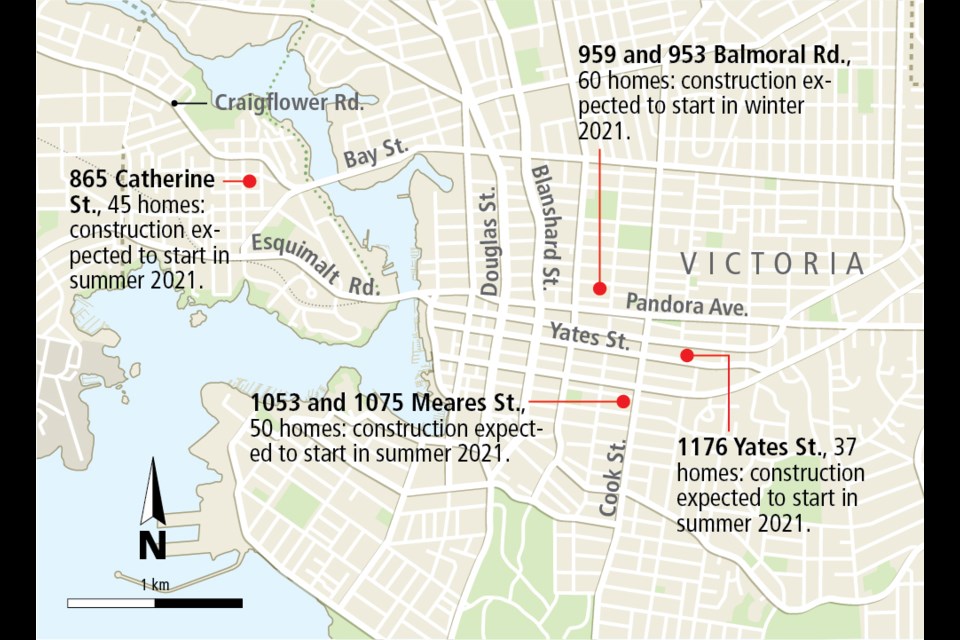The B.C. government is fast-tracking four new supportive housing projects in Victoria for people without homes, bypassing public hearings and council approvals to begin construction as early as this summer.
David Eby, attorney general and minister responsible for housing, said the projects will deliver up to 192 permanent homes with around-the-clock supports. That’s in addition to the ongoing work to open temporary shelters for people currently living in city parks.
B.C. Housing plans to build 45 units at 865 Catherine St., 60 units at 959 and 953 Balmoral Rd., 50 units at 1053 and 1075 Meares St., and 37 units at 1176 Yates St.
Construction of the Balmoral project will begin next winter, while the other three are scheduled to get underway this summer, the government said. All will be completed by the summer of 2022 or earlier.
Eby defended the accelerated process, saying Victoria asked the province to move quickly in response to residents’ demands for action on homelessness.
“People wanted their parks back … they wanted the misery and suffering on their doorsteps to end as quickly as possible and on a fixed timeline,” he said.
“So where a democratically elected local government, that’s put in place by their constituents, wants to work in this way, we’re happy to work with them.”
Victoria Mayor Lisa Helps confirmed the city’s support for the process, saying “we think that it’s important to get this housing built as quickly as possible.”
She said there will still be opportunities for people to learn about the projects and provide input to B.C. Housing.
“So they’re not just putting their heads down and starting digging holes in the ground,” she said. “They’re doing a deep community engagement process. But the question isn’t, ‘Do you want these homes?’ The question is, ‘These homes are coming, how can we make them work for everybody in the neighbourhood?’ ”
Vic West residents, however, are already raising concerns about the lack of information and neighbourhood consultation regarding the proposed project on Catherine Street across from The Market Garden.
“We are not opposed to supportive housing,” said Jes Cross, one of the organizers of the newly formed Vic West Together – Neighbours Creating Safe and Supportive Community.
“We actually have a number of low-density supportive housing units within Vic West.”
But she said residents are worried about the size of the proposed project, its proximity to an elementary school and the absence of other support services in the neighbourhood.
“Ultimately, at the end of the day, the neighbourhoods are left to support these individuals,” Cross said. “And, at the moment, we don’t have any support or any outreach programs. We don’t have the services that they have downtown.”
Ryan Townsend, owner of The Market Garden, said he recognizes the need for supportive housing. But he said it’s important that it’s done well and that B.C. Housing follows the same municipal approval process as other developers.
“It does impact a lot of people within the community and I do believe their voices ultimately need to be heard,” he said.
Eby said the new housing projects will be different from the temporary shelters in motels and hotels, which led to a rise in calls to police and complaints from neighbours who said they felt unsafe.
“It will be a very different ballgame,” he said. “There’ll be tenant selection. The buildings will be purpose-built. And service providers and the supports there will be appropriate for the tenants who are selected for these buildings.
“We’ve built that into our process here to be careful and to learn our lessons from the last encampment.”
Non-profit agencies operating the sites will provide daily meals as well as employment counseling, physical and mental health supports and addiction recovery services.
Project costs will be released once budgets are finalized, the province said. Money will come from the Building B.C. Supportive Housing Fund.
The four Victoria projects are in addition to two others in Central Saanich and Saanich announced by the Capital Regional District in partnership with the federal and provincial governments.
All six projects will deliver more than 280 permanent homes.



